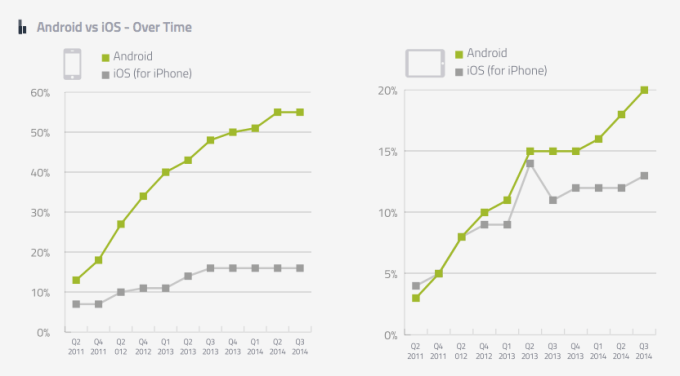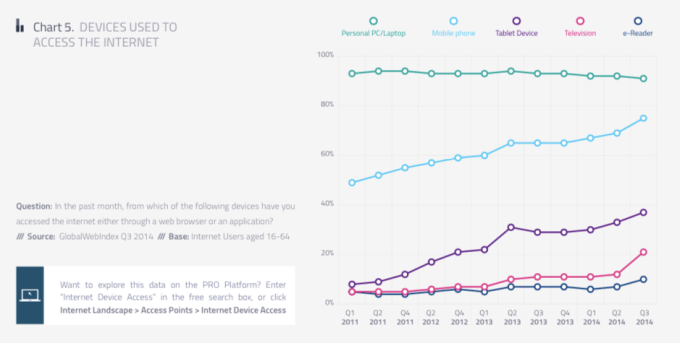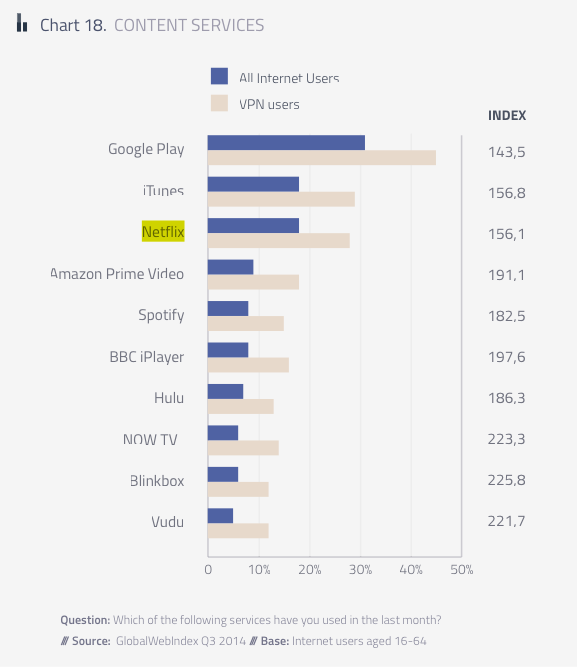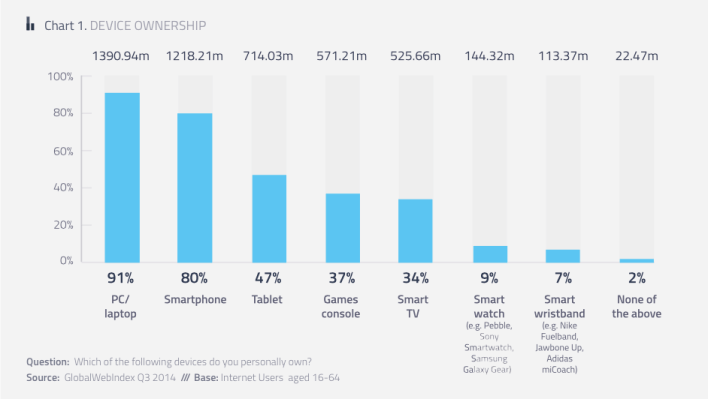If people are looking to Apple and its new smartwatch to kickstart wider consumer interest in wearable computing gadgets, the maker of the iPhone will have a lot of work ahead of it. New research out from the GlobalWebIndex indicates that in a survey of 170,000 adult internet users across 32 markets, only 9% report having a smartwatch, and 7% said they owned smart wristbands. In contrast, among online adults, 80% now own a smartphone.
The proportion of smartphone ownership has reached a new high, but it has not yet overtaken legacy ownership and usage of PCs, which is currently at 91% of all online adults.
Some other interesting data points highlighted in GWI’s research:
— Wearables. Within the wearables category, the biggest number of device owners are affluent males in the 25-34 year-old group who reside in the Asia Pacific region. This points to these smaller, portable and more narrowly functional devices continuing their market placement as niche products that have yet to find a groove to appeal to a wider range of consumers.
— Platform ‘wars’ are over and Android won. Breaking out how different mobile platforms are performing in the smartphone and tablet sectors, it’s no surprise to see that Android is firmly ahead of iOS. What’s interesting to see, however, is just how far they have diverged and when.

We have heard various market analysts point out that Apple’s iPhone sales have seen a big bump in the wake of the launch of the iPhone 6 models, but it’s not clear that the ownership picture as depicted by GWI supports that.
While Android was creeping up quarter on quarter, the difference between Q2 and Q3 noticeably got flatter, which could indicate slowing sales, except that the iPhone numbers appeared to flatten/increase only very slightly.
In other words, if there has been an impact, it will have to be sustained by Apple to show any meaningful shift in ownership. As it stands now, Android’s 54% share represents a 38-point lead over iPhone/iOS, with the gap widening.
Back in 2011, the ratio of Android to iOS users was just under 2:1; in 2014, it has increased significantly to approach 3.5:1, GWI notes.
Whether that divergence will ultimately start to play out in where developers invest their time and efforts will be the really important question for users (and Apple).
— Tablets. In tablets, to me the most interesting point is a historical one: we like to talk about how Apple and the iPad dominate tablets, and while that may be the truth as far as the single brand is concerned, when it comes to platform dominance, Apple hasn’t been in a leadership position since Q4 2011, and really dropped away from a close position in 2013.
— Mobile internet use. GWI says that 75% percent of smartphone users are accessing mobile internet services on their smartphones — meaning a whole 25% are still not. The average amount of time that people are spending on their mobile devices is 1.85 hours/day, up by about 40 minutes on 2012. Because emerging market consumers often replace PCs with phones, they are using those phones the most, on average at more than three hours/day in the Middle East and Africa.

As you can see in the chart, mobile is used for Internet access far more than tablets, TVs and e-readers, but as with device ownership, it’s not yet passing PC/laptop usage, which is around 90%.
— VPNs, popular content. GWI also delves into what kinds of content is being consumed on the Internet access front, and how users are getting to it. The rising tide of restrictive firewalls in some markets has led to increased usage of VPNs to access the Internet. These VPNs effectively let you appear on the Internet as if you are somewhere that you are actually not. Currently, GWI says that some 27% of respondents, of 400 million users, say that they have used VPNs to go online, with China alone accounting for 150 million people.
Among those users, they are unsurprisingly significantly more avid online consumers of content than those not using VPNs. Google Play scored the highest of all services accessed by VPN and regular Internet users, who would be turning to the search giant’s store not for apps but for video and audio and gaming content.

